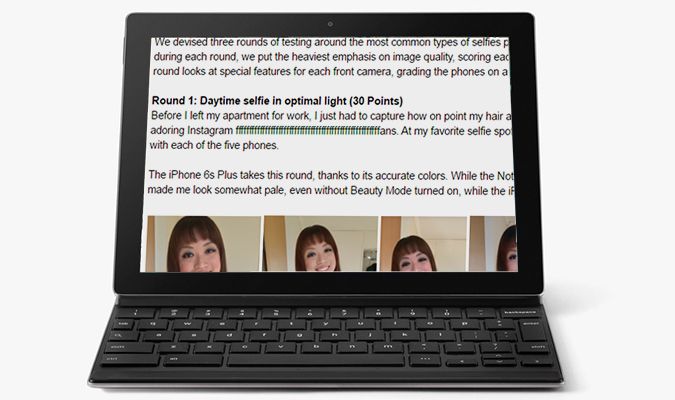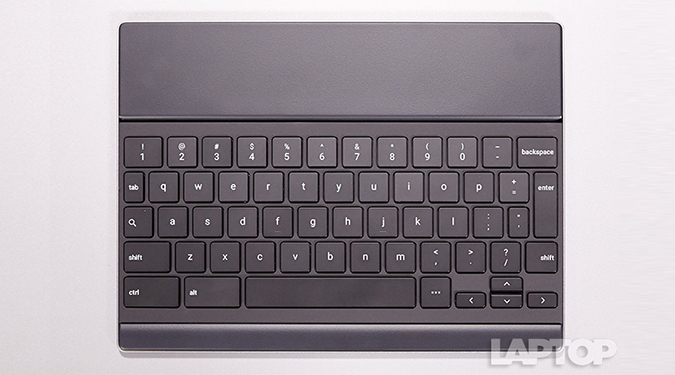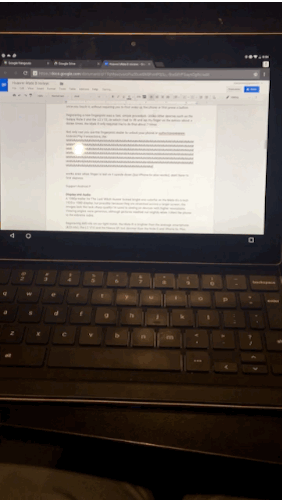Son of a Glitch! Pixel C Keyboard Is Fatally Flawed
Ffffffffff. That's both what you'll say and what you'll see on the screen when you're typing with the keyboard that's designed to accompany Google's latest Android tablet, the Pixel C.
After a brief encounter with what I can only describe as the worst keyboard I've ever used, I'm ready to throw this dumb accessory against a wall and fling its parts into a bottomless pit of flames. I cannot believe Google has the nerve to charge $150 for this worthless keyboard that's more of a hindrance than a help.
I was trying to get some work done at a café one night, using the Pixel C I'd borrowed for the day. I picked the Pixel C for its compact size, since I didn't want to have to lug something heavy home and then back to the office the next day.
My first challenge was in setting up the device in laptop configuration. I tried to open and assemble the clamshell combination of tablet and keyboard, getting incredibly confused because its superstrong magnets would latch onto each other in various orientations, like upside down or face-to-face.
When I finally figured out that you had to first lay the tablet horizontally on the keyboard and then pull up the stand, which took up a third of the keyboard, I thought I was ready to be productive. But the problems were just beginning.
MORE: Best 2-in-1s (Laptop/Tablet Hybrids)
First of all, to make room for the magnetic hinge, Google had to do away with a touchpad on the keyboard. I found it annoying to keep having to reach out to the display to navigate pages or move my cursor. It's like having to go to the basement to get food while you are cooking in the kitchen — it's inconvenient and tiring, and distracts from the task at hand.
Sign up to receive The Snapshot, a free special dispatch from Laptop Mag, in your inbox.
And like Chromebook keyboards, the Pixel C's layout replaces the Caps Lock with a Search button, which is disorienting for expressive typists like me looking to YELL OUT MY FRUSTRATIONS ONLINE. Chrome OS/Android keyboards also lack the Home, End, Insert and Delete keys that you'll find on PCs — important shortcuts for power users.
The Pixel C keyboard also does away with the bracket and backslash keys, and makes the Enter button smaller than it usually is. So, instead of reflexively striking the button with my pinkie, I had to stretch farther and aim carefully before sending my messages or breaking a new line.
While these layout problems are easy to get used to, the keyboard ultimately suffers from fatal software problems. The accessory connects to the tablet via Bluetooth over a connection so tenuous and fragile that even a single thread from a spider's web might be stronger.
When I was midway through writing a review, the keyboard straight up stopped working, not responding when I jabbed furiously at letters. Seconds later, when the connection had been re-established, letters that I had been typing appeared like angry army ants, as if the keys were jammed. I had to hit another button to stop the sequence. If the last button I had pressed before the connection dropped out was Backspace, much of my work would have been eaten up when the devices linked back up.
It was impossible to predict when the connection would drop out, too. There was no connectivity symbol or warning that would pop up, letting me know to lift my fingers off the keyboard and wait.
And It's Not Just Me
Reviewers for other sites also noted the glitchy software. The Verge's Dieter Bohn wrote in his Pixel C review, "When it drops, nothing registers for a few seconds. When it returns: fffffffffffffffffffffff (literally and figuratively)."
CNET's Xiomara Blanco, in her 8.6/10 review, said, "the keyboard suffereddd [sic, as an example of the keyboard problem in question] from frequently stuck keys. They weren't physically stuck, but letters and key functions dragged out on the screen as if they were." But, she noted, her CNET en Español colleague did not encounter this issue.
Digital Trends' Brad Bourque called the keyboard "poor" and its layout "wonky," and added, "Responsiveness can be shaky at times, but in a pinch, it gets the job done."
The Guardian's Samuel Gibbs noted, "I did suffer occasional hiccups in connectivity when using it near a few other Bluetooth devices. A Bluetooth mouse, for instance, caused havoc when placed right next to it, but a phone, headphones, a smartwatch and fitness tracker that all connect via Bluetooth had no effect on it."
To be fair, many others haven't experienced this problem. Our own Henry T. Casey tested the Pixel C at home and at work, without a lot of other Bluetooth connections in either location, and did not experience the problem. Android Authority's Lanh Nguyen even recommended getting the keyboard "if you're looking to get the most out of this tablet."
TechRadar's John McCann even called the Pixel C the best Android tablet around, having not come across this issue. Engadget's Devindra Hardawar also said the keyboard felt great but faulted Android's unsuitability for productivity devices.
The Real Problem
Don't get me wrong. The Pixel C on its own is a fine Android tablet. It's beautiful, sturdy and speedy. But what irks me is that a product this riddled with glitches is actually being sold, and for $150. What happened to rigorous testing? What happened to quality control?
If this were a Bluetooth keyboard from a no-name maker, I would have been far less upset. Yes, I would still be mad that I paid good money for a crappy tablet accessory, but software incompatibility is a bit more understandable from a third-party vendor. With the Pixel C, Google was in charge of all aspects of the hardware and software, so it had the ability to avoid these problems.
As Brandon Chester and Joshua Ho at our sister site Anandtech wrote, "It's honestly shocking to see these issues on a device designed by Google running software designed by Google."
A lot of the connectivity issues I encountered affected the touch screen as well, so it's not simply the keyboard that's at fault. But an accessory that's supposed to turn a tablet into a productivity powerhouse cannot lack essential components such as a touchpad or navigational shortcut keys. Even more important, it cannot randomly stop and start, or eat up words in a significant document, regardless of the environment it's in or the presence of Bluetooth accessories around it.
Yes, we gave the Pixel C 3.5 stars in our review, but the keyboard on its own earns Google a giant "00000000000."






